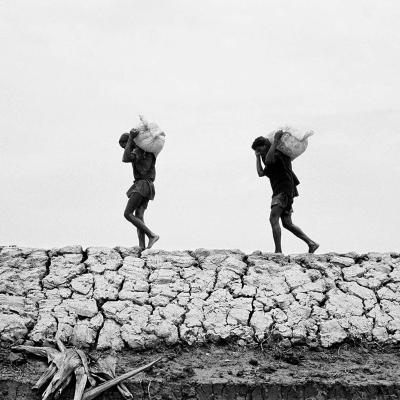“I’m 27 and I have never lived in another country. I don’t understand what prevents me from voting and participating in society. […] Things that seem simple to other people are so difficult for us.”
Christiana Bukalo, founder of Statefree
KEY MESSAGES
- Nationality is the gateway through which people access rights and services, and is an important part of a person’s social identity.
- Statelessness impacts on every aspect of a person’s life through restricting access to basic rights and services. It can also have an acute impact on mental health.
- Human rights affected by being stateless include an array of both civil and political rights and socioeconomic rights.
- Statelessness is both caused by discrimination, and causes further discrimination, in a self-perpetuating cycle. Stateless people can be a target for exploitation, persecution and even genocide, making statelessness a root cause of forced migration.
- The consequences of statelessness can create a ripple effect, affecting not just the individuals but also family members, their community, wider society and the international community.
IMPACTS OF STATELESSNESS
Nationality is the gateway through which people access rights and services in our state-centric world. It is also an important part of a person’s social identity, offering a place to call home and a community to belong to. The lack of nationality impacts on every aspect of a person’s life. Stateless people often face many challenges, including: entering or completing schooling; accessing healthcare services for preventative medicine or to treat an injury or illness; finding formal employment or signing a labour contract; buying or inheriting a house; buying land; registering a car or a business; obtaining a birth certificate, driving license, marriage certificate or even death certificate; opening a bank account or getting a loan; falling back on social security; and enjoying a pension.
Moreover, in many situations, statelessness actually becomes a conduit or catalyst for human rights violations, be they perpetrated by the state or due to a vacuum of state protection. Being slated as outsiders, not just by their country but by all countries, make stateless people easy targets for victimisation within society as they may be seen as less deserving of compassion, protection and support. Discrimination is therefore at the root of statelessness. It not only causes statelessness, but is also a reason for further discrimination, playing out in a self-perpetuating cycle. Stateless people are often a target for hate speech, increased violence, or exploitative practices such as forced labour or extortion. Indeed, the treatment of stateless people can, in certain instances, amount to persecution and even genocide, as in the case of the Rohingya. Statelessness is also a root cause of forced displacement.
CIVIL AND POLITICAL RIGHTS
Political rights, such as the right to vote or stand for election and to perform certain public functions, are usually restricted to a country’s citizens, meaning that stateless people are excluded. Disenfranchisement is therefore an immediate and almost universal problem, limiting stateless people’s ability to influence the laws and policies that affect them or to call for reforms that would bring an end to their statelessness. This undoubtedly also contributes to the invisibility of and lack of attention to the problem of statelessness in general, and its resultant manifestation and growth over generations.
Other civil rights are also affected, including the right to free movement, the right to (re)enter and reside in your own country, and the right to liberty and security. As a stateless person, international travel is almost inconceivable due to lack of documentation, unless by illicit – and dangerous – means, meaning that stateless people are also at a higher risk of being trafficked. Travel within their country can also be difficult due to the person’s precarious legal status or the inability to provide proof of identity if stopped at a security checkpoint or in a random check by the police. Often, even if in possession of a stateless person’s travel document, migration can be difficult and stateless people face increased risk of questioning, denial of entry, or detention at the border, and can be prevented from re-entering their own country. Stateless people are at a higher risk of prolonged, arbitrary detention, even within their home country. A stateless person is highly vulnerable to be “simply left to languish for months and years…without any authority taking an active interest in his fate and well-being”. This is largely because immigration systems and detention regimes do not have appropriate procedures in place to identify statelessness and to protect stateless people; and stateless people do not have any country to be deported to, so may face being detained indefinitely.
Where a stateless person wants to assert their rights, or where they have become a victim of crime or exploitation, their statelessness can also stand in the way of getting help from the authorities or finding their way to a court. Their complaint may be readily dismissed or ignored, and they are powerless to take a stand against this due to their status of disenfranchisement. Stateless people live in a permanent condition of insecurity, affecting freedom of expression and freedom of assembly. Stateless activists are particularly at risk – exposing themselves through engaging in activism can lead to a higher risk of reprisal.
SOCIOECONOMIC RIGHTS
Socioeconomic rights and services are provided to citizens by the state, limiting access for non-nationals and stateless people. Many healthcare systems are based upon nationality, meaning that stateless people are excluded, or they may have to pay a high fee to access healthcare, which can deter them from seeking medical attention. This was particularly apparent during the COVID-19 pandemic, where stateless people were excluded from COVID-19 testing and vaccination in many countries, and also suffered from lack of awareness on COVID-19 prevention measures due to information not reaching them. Many were also fearful to seek healthcare due to fear of harassment by authorities. Environmental determinants of health, including living in densely populated areas, also affect stateless people’s health, as well as lack of access to education surrounding hygiene and sanitation measures.
Statelessness can also have an acute impact on mental health. Stigma, discrimination, confusion surrounding identity and lack of social support have all been cited as reasons affecting mental health. Discrimination as a result of statelessness can include harassment, hate speech, wage discrimination, discrimination in hiring, as well as discrimination in accessing basic rights and services.
Education opportunities are also limited – although a stateless person may in some countries be able to attend school, they may be unable to graduate without documentation. The denial of education for stateless children forces them to rely on informal or non-formal systems which are inadequate alternatives to formal education. Lack of resources and qualified educators, interruptions in studies and most importantly the lack of accreditation and recognition often prevents stateless children from progressing to secondary and higher education. These factors have a direct impact on the value marginalised families place on education and whether children are even enrolled in school, whether they remain or whether they eventually drop-out.
Stateless people struggle to access the formal labour market or to register a business due to their precarious legal status or lack of documentation, and therefore often work informally, which increases their chance of exploitation. Lack of ability to open a bank account also affects their ability to work in the formal labour market. Stateless people can therefore struggle to build a sustainable livelihood – a problem compounded by the difficulties accessing or completing formal education, training or technical or vocational studies. They are also unlikely to be eligible for social security schemes or any other safety nets provided by the government or other institutions. This was a huge problem during the COVID-19 pandemic, when stateless people were excluded in many countries from life-saving, emergency relief packages, including social security schemes, economic support and food packages. Moreover, stateless people may be denied land rights, or in extreme cases, further debilitating and dehumanising restrictions may also be imposed, such as on marriage, reproductive rights, or burial rights.
IMPACT ON FAMILY, COMMUNITY AND SOCIETY
The consequences of statelessness can create a ripple effect, affecting not just the individuals but also family members, their community, wider society and the international community. Statelessness of a single family member can create problems for all due to the difficulties it causes and the tension and stress that can ensue. A mother who holds nationality, but whose son is stateless, worries that he will never have a family of his own because he is condemned to a life without nationality, and to pass this on to his own children. The lack of ability to gain formal qualifications or access the labour market can not only result in stateless people being unable to provide for family members, but affects their participation in and contribution towards society.
A country in which a whole community has been excluded, disenfranchised, stigmatised and even vilified through the denial of nationality may face social tensions that affect both stateless people and citizens alike. Mounting tensions between the “in” group and those portrayed as outsiders can also fuel conflict. Where conflict arises or where stateless people face such severe restrictions or violations of their fundamental rights that they are forced to seek sanctuary elsewhere, their displacement becomes a concern for the receiving country and the international community as a whole.
[Last updated: December 2023]
Cover image by Greg Constantine
Further reading
Voices & Experiences
-
Women’s testimonials in Syria
![Syria Picture 1]()
Women’s testimonials in Syria
![Syria Picture 1]()
“My husband was a Tunisian by nationality and was killed in one of the battles, and since that time communication with his family has been completely cut off. I have not been able to obtain any information about his identity to help me prove the lineage of my two children who have become victims of my family’s greed, who forced me to marry him”.
Souad,
Syrian Woman
Syria is one of 24 countries globally that discriminate against women in relation to the conferral of nationality to their children. This can have far-reaching impacts for women and their children, and creates a risk of statelessness when the legal ties to the father cannot be established.
Voice from https://lb.boell.org/sites/default/files/2021-11/Hunans%20without%20rights%20.pdf
-
Challenges in Accessing Human Rights for Stateless People in Malaysia
![Malaysia 3]()
Challenges in Accessing Human Rights for Stateless People in Malaysia
![Malaysia 3]()
“The impact of statelessness can be seen through many facets; one being the most crucial is the dire need to earn a living without being discriminated through low wages, long hours and dangerous jobs. Other impacts are evident through the unavailability to get access to healthcare services while children are not allowed to enrol in schools. They are often denied basic rights and the reflection of many attitudes towards the stateless community results in them living in fear while making it almost impossible to earn a livelihood and survive.”
Professor Dato’ Noor Aziah Mohd Awal
Human Rights Commission of Malaysia (SUHAKAM)
Numerous groups face statelessness or the risk of statelessness in Malaysia, such as indigenous peoples, foundlings, individuals affected by gender-biased nationality laws, refugees, migrants, and their descendants. This includes those who arrived in Malaya before its independence in 1957 or in Sarawak and North Borneo (now Sabah) before the formation of Malaysia in 1963. Gender discrimination persists in Malaysia's citizenship law, as Malaysian women cannot automatically grant citizenship to their children born abroad. While the Malaysian constitution offers protections against childhood statelessness, particularly for foundlings, poor implementation undermines their effectiveness.
Voice from https://files.institutesi.org/together_we_can_report_2021.pdf
-
BORN STATELESS - families and lawyers share the impacts of child statelessness in Europe
![born stateless video]()
Latest Resources
-

Article: The law is clear on birthright citizenship. Can Trump end it anyway?
Type of Resource: News/ Media reporting / Blog
Theme: Children
View -

Blog: Age, life stages and legality: insights from long-term ethnographic research in northern Thailand
Type of Resource: News/ Media reporting / Blog
Theme: Children
View -

WEBINAR 1: No justice without identity
Type of Resource: Video/ Webinar
Theme: Lived Experience of Statelessness
View



